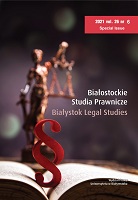Challenges of Customs Law during the Paradigm of “Facility and Security” in International Trade
Challenges of Customs Law during the Paradigm of “Facility and Security” in International Trade
Author(s): Mirosława Laszuk, Dana ŠramkováSubject(s): International relations/trade, Security and defense, Law on Economics
Published by: Temida 2
Keywords: customs control; facilitation; paradigm; security; trade;
Summary/Abstract: Changing conditions within international trade as well as the implementation of the facilitation and security paradigm have significantly impacted the structure of customs law. Both the SAFE Framework as well as the Trade Facilitation Agreement had indicated the need to maintain a balance between regulations introducing simplifications and those ensuring safety and security. One example of such a solution is the institution of the authorised economic operator (AEO), which grants those entities opportunities to take advantage of a number of simplifications, such as the filing of the simplified customs declaration, making entries in a registry, or performing self-assessments, but, at the same time, maintains the requirement of safety and security (through a detailed audit of the enterprise before AEO certification). However, by allowing authorised economic operators to perform self-assessment in respect of goods that have entered into the customs territory of the European Union and are to be released for trade, EU legislators have created significant challenges concerning the realm of safety and security, especially concerning the institution that is the most important within that area - that of customs controls. Despite all this, its importance to safety and security remains distinctive and may be seen in the emergence of new types of customs controls which concern only this particular sphere.
Journal: Białostockie Studia Prawnicze
- Issue Year: 5/2021
- Issue No: 26
- Page Range: 9-21
- Page Count: 13
- Language: English

